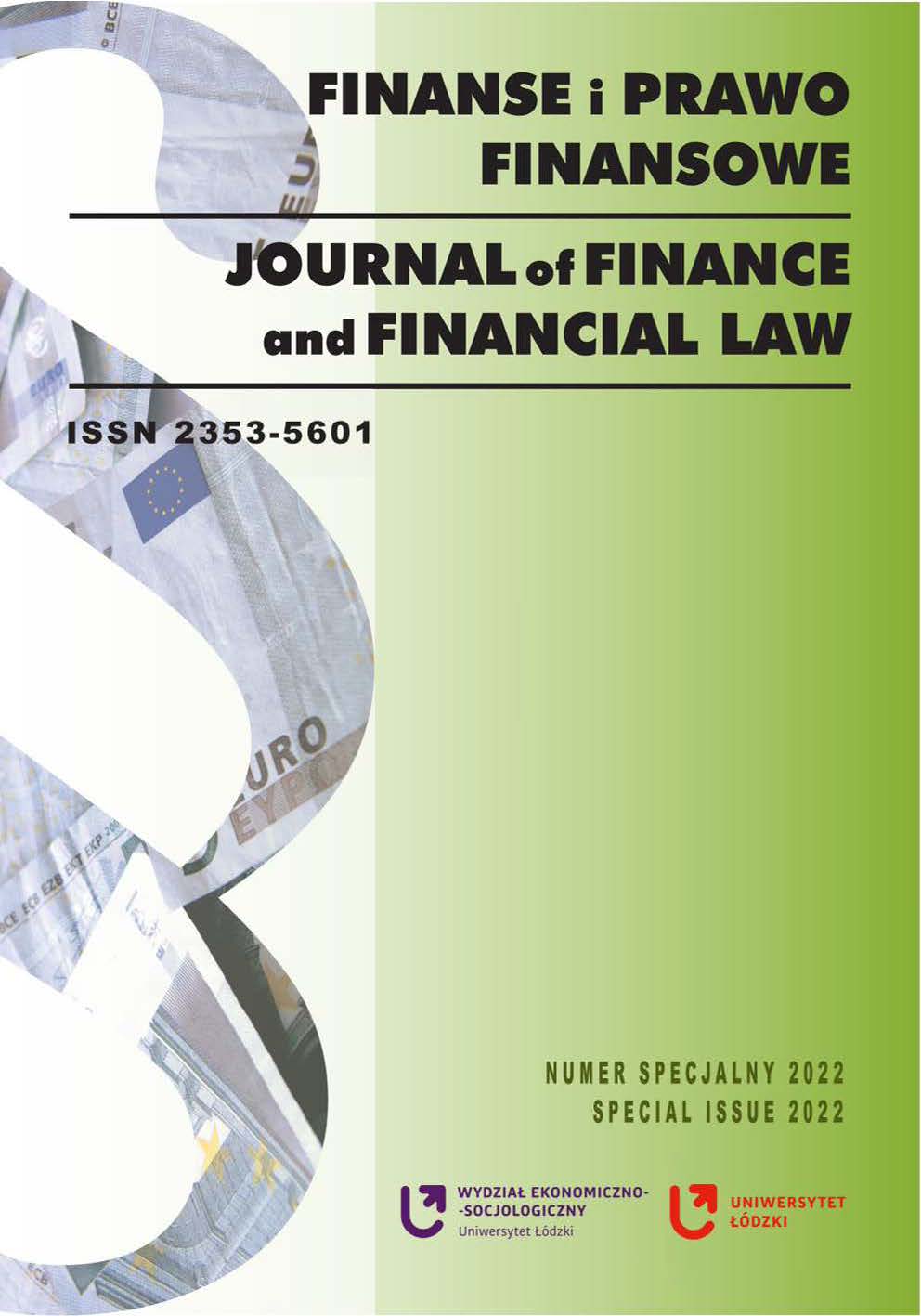Democracy, Economy, Progress and the Rule of Law. Special Reference to the Tax Regime for Religious Denominations
DOI:
https://doi.org/10.18778/2391-6478.S.2022.07Keywords:
democratic state, social state, the rule of law, financing and taxationAbstract
The purpose of this article is twofold: on the one hand, to relate the fiscal and financial model to the Social and Democratic Rule of Law, on the other one, to transfer Spanish experiences that may be of interest to Poland, as both countries began their democratic experience and integration into the European Union a few decades ago. From a multidisciplinary perspective, the contributions that law could make to the field of political economy can be of capital importance for the consolidation of our democratic systems, public order, and social peace, analyzing the role of religious confessions. Methodology. To achieve this purpose, the analytical-comparative-interdisciplinary method was chosen as it was considered the most appropriate one in view of the close connections between economics, law, progress and social peace. The result of the research. The work shows that democracies, although they are the most effective models for achieving the highest standards of progress, and even though in the Polish and Spanish cases, they have the advantage of having served to bring dictatorial periods to an end, there is a need for effective control mechanisms. Democracies absolutely cannot degenerate into corrupt and ineffective systems under the control of large political and partisan oligarchies. The independence of the judiciary is, in this sense, an essential and inalienable element in guaranteeing the correct functioning of other state institutions. It is necessary to insist on the importance of the legal norm as an instrument of political control and its impact on macroeconomics, and the consolidation of democratic regimes, even more in the context initiated with the respective integration processes in the European Union. On the other hand, the aim is to show how beneficial tax treatment for religious denominations has a powerful effect on the achievement of the common good and social peace. In addition, it is about relating importance that has the budgetary balance and mechanisms for controlling public expenditure for the maintenance of progress and social justice in a sustainable model.
Downloads
References
Álvarez, A.-C. and Rodríguez, M. (2008). Aspectos del régimen económico y patrimonial de las confesiones religiosas. Granada: Comares.
Google Scholar
Antuñano, I. and Fuentes, V. (2015). Política fiscal y presupuestaria (I). Ingresos y gastos públicos. In: C. Ochando, Políticas Económicas coyunturales. Objetivos e instrumentos. Valencia: Tirant Lo Blanch.
Google Scholar
Ayala, L. (2021). La Economía del Estado de Bienestar. Madrid: Civitas.
Google Scholar
Banco De España (2005). El análisis de la economía Española. Madrid: Alianza.
Google Scholar
Barrena, A. (1978). La Democracia como problema. Madrid: ICAI.
Google Scholar
Bentolila, S. et al. (2010). La crisis de la economía Española. Madrid: Fedea.
Google Scholar
Buitrago, E. and Romero, L. (2013). Economía de la Unión Europea. Análisis económico del proceso de integración europeo. Madrid: Pirámide.
Google Scholar
Catalá, S. (2004). El pluralismo religioso en la Unión Europea. Encuentros Multidisciplinares, VI(18).
Google Scholar
Catalá, S. (2008). La Alianza de civilizaciones en clave jurídica. Encuentros Multidisciplinares, X(30).
Google Scholar
Catalá, S. (2013). La crisis económica española vista desde la otra orilla. Encuentros Multidisciplinares, XV(43).
Google Scholar
Comín, F. et al. (2020). El Estado de bienestar en España: crisis económica y desigualdad. Estudios en homenaje a Salvador Salort. Barcelona: Publicacions Institucionals Universitat d'Alacant.
Google Scholar
Cuadrado-Roura, M. and Parellada, M., ed. (2002). Regional Convergence in the European Union: Facts, Prospects and Policies. New York: Springer.
Google Scholar
DOI: https://doi.org/10.1007/978-3-662-04788-0
Galindo, M.A. and Fernández, Y., Coords. (2006). Política socioeconómica de la Unión Europea. Madrid: Delta.
Google Scholar
Gallego et al., Coord. (2003). Estado de bienestar y Comunidades Autónomas. Madrid: Tecnos.
Google Scholar
García, N. and Ruesga, S. (2014). ¿Qué ha pasado con la economía española? La gran recesión 2.0 (2008 a 2013). Madrid: Pirámide.
Google Scholar
García, R. (2008). La libertad religiosa en España: Colaboración entre el Estado y las Confesiones religiosas. Encuentros Multidisciplinares, X(30).
Google Scholar
Garrigues, A. (2013). España, las otras transiciones. Articulos, conferencias y reflexiones. Madrid: Nobel.
Google Scholar
González del Valle, J.M. and Ibán, I.C. (2002). Fiscalidad de las confesiones religiosas en España. Madrid: Centro de Estudios Políticos y Constitucionales.
Google Scholar
Linde, E., Coord. (2006). Políticas de la Unión Europea. Madrid: Colex.
Google Scholar
Martín, I. (2004). El diálogo entre la Unión Europea y las Iglesias y organizaciones no confesionales. Encuentros multidisciplinares, VI(18).
Google Scholar
Ochando, C., Coord. (2015). Políticas económicas coyunturales. Objetivos e instrumentos. Valencia: Tiran Lo Blanch.
Google Scholar
Punzón, J. (2009). Los orígenes de la política regional comunitaria. Cuenca: UCLM.
Google Scholar
Rodrigues Aráujo, A.M. (2012). Iglesias y organizaciones no confesionales en la Unión Europea. El artículo 17 del TFUE, Pamplona: Universidad de Navarra.
Google Scholar
Rodríguez, A. (1995). Reestructuración socioeconómica y desesquilibrios regionales en la Unión Europea. Madrid: Instituto de Estudios Económicos.
Google Scholar
Sáez, J.L. (2000). Economía y política en democracia. Madrid: Pirámide.
Google Scholar
Sánchez, J. (2009). Democracy in the spotlight. Philosophical essay on democracy. Madrid.
Google Scholar
Tamames, R. (1987). Introducción a la Economía Española. Madrid: Alianza.
Google Scholar
Tamames, R. and Rueda, A. (2008). Estructura económica de España. Madrid: Alianza Editorial.
Google Scholar
Velarde, J., Coord. (2011). Lo que hay que hacer con urgencia. Madrid: Actas.
Google Scholar
Viñas, A. et al. (2016). Análisis del entorno económico internacional. Instrumentos y políticas. Madrid: Garceta.
Google Scholar
Downloads
Published
How to Cite
Issue
Section
License

This work is licensed under a Creative Commons Attribution-NonCommercial-NoDerivatives 4.0 International License.














